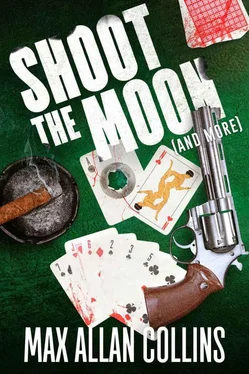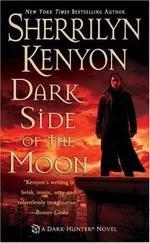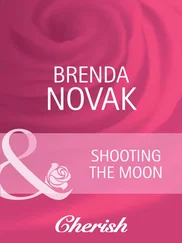Normally, I wouldn’t mind at all being led away by a girl as beautiful as this, a girl who had that golden-haired wholesome look used in television commercials to make the American male think of sex and buy milk.
But I was in no mood for sex or milk or lemonade, either. I was, remember, in the middle of the worst situation of my life, and this vision of blond Midwestern liveliness was walking in at a most inopportune moment. I don’t mean to be a complainer, but I think you’d have to agree that Fate just hadn’t been on my side through this whole thing, and this was a hell of a time to throw me a crumb, even a beautiful, shapely crumb like this.
Anyway, pretty soon we were standing in front of the Tacomobile and she was saying, “You still haven’t told me what you’re doing in Wynning.”
I opened my mouth, but my mind couldn’t seem to find anything to fill the opening.
“I know!” she said, suddenly brightening. “You came to see me , didn’t you!”
“Right,” I agreed. “Right. To see you.”
“How did you know where to look for me? How did you find me?”
“Uh,” I said.
“You’re a sly one,” she said, nudging me in the ribs, winking. “Going to keep me guessing, huh?”
“If I, uh, told you how I found you,” I heard myself saying, “that’d take, uh, some of the fun out of it. Some of the mystery.”
A nice-looking brown-haired girl in one of the hideous marching band uniforms was ahead of us in line at the Tacomobile window. She heard us talking and turned and looked with envy and even scorn at her fellow band member wearing the skimpy, sparkly majorette outfit, and said, “Who’s the new boyfriend, Sue Ann? Find a replacement for Bo Bo so soon?”
Sue Ann put her hands on her very attractive hips and smiled at her catty friend in genial defiance. “His name is Fred Kitchen,” she said. “And he came all the way from Sycamore, Illinois, to see me, didn’t you, Fred? Fred? Are you all right, Fred?”
I was Fred, all right. The TILT light in my head was going on, but I was Fred. I conjured up a smile as weak as my knees. “I’m fine,” someone said. Me, apparently.
The brown-haired girl said, “Hi, Fred. I’m Julie.” She extended a hand.
I looked at it. After a while I remembered about shaking hands, yes, that’s a native American custom, shaking hands. I shook her hand. I shook period.
Sue Ann said, “Fred, are you sure you’re all right? You look kind of sick.”
“Uh, Sue Ann,” I said. “Could we go someplace private and talk?”
The brown-haired girl, Julie, said, “Well!” huffily, like Jack Benny, and turned quickly away. I guess I hurt her feelings or offended her or something, although I hadn’t meant to be rude; my mind was not organized enough at the moment for me to do anything so controlled as to be purposely rude to someone.
But Sue Ann didn’t seem to mind my accidental rudeness, and even smiled at me for it. Even in my shell-shocked state, it was coming through that the two girls didn’t like each other much.
So I bought lemonades at the Tacomobile window and Sue Ann led me behind the concession wagons up onto the step-up sidewalk, where we sat on the slight porch of one of the storefronts.
Sue Ann slurped at her lemonade. Through a straw. She had on some sort of pale, frosty lipstick that made her lips glisten like the sparkles on her skimpy suit.
So she knew me. I remembered vaguely telling here my name was Fred, when I bumped into her, streaking; but I didn’t remember telling her Fred Kitchen. Or had I?
Finally she looked up from her lemonade and said, “Are you always so quiet, Fred?”
“No. I’m just a little... surprised.”
“Surprised? Why? I’m the one who’s surprised, having you come look me up like this!”
“Well, I’m surprised you remembered my name, is all.”
“Silly! You were in all the papers! Don’t you think I was interested, having bumped into you like I did? I almost felt famous myself! I saved all the clippings.”
“No kidding?”
“Sure! That’s a really funny picture, you know, of you and your friend streaking through those wedding guests. But maybe it doesn’t seem so funny to you. I mean, going to jail and all.”
“Jail wasn’t so bad.”
“Really? Well, I suppose if you’re stuck inside a place like that for a whole month you learn to live with it. Maybe even make some friends, I suppose.”
“I made some friends I’ll never forget.”
“I’ll bet! Do you keep in touch with any of them?”
“Now and then.”
She slurped her lemonade thoughtfully for a moment, then said, “Listen, Fred, I’m... I’m really touched by what you’ve done.” I was touched, too: she was touching my knee. “I mean, it’s really something, you going to so much trouble to track me down so you could see me again.”
“It was nothing,” I said.
“Hey,” she said, “you know, it’s not necessary for me to hang around here, at this Founder’s Day thing. I mean, I’m done for the day. All I had to do was my majorette stuff when we marched in behind the governor’s car, and that’s it. I don’t have any part in the band concert, later on, there’s no part for a majorette in that, so... so how would you like to go over to my house, and try to think of something to do?”
I would like that fine. It was escape. Limited escape, perhaps. Illusionary, temporary escape, certainly. But escape.
Out of this Founder’s Day nightmare, for a while at least.
“What... what if your parents should come home?” I asked.
“Who says we’d be doing anything they wouldn’t approve of?” she asked, coyly. Then squeezed my knee again and said, “Besides, Mom’s out of town, tending her sick sister. And Dad was called out of town, too, on business, unexpectedly.”
“Your dad was what?”
“Called out of town on business, unexpectedly. He works right here.” And she jerked a thumb over her shoulder at the building behind us.
At which point I realized for the first time we were sitting on the stoop in front of the bank.
When my heart started up again, I said, “Your... your father is the local banker?”
She nodded. “But don’t you worry about him coming home. He’s going to be tied up all day.”
We walked to where she lived. It wasn’t far. In fact it was just around the corner from the bank, on a street as quiet, clean and residential as those I’d driven through coming into town this morning. These homes were newer, however, and there were fewer trees. Modern houses, ranch styles mostly, three-bedroom numbers, sitting on flat, well-tended lawns. Wynning’s two-and-a-half block housing addition.
Sue Ann Wynning, her mother and-father (Sue Ann was an only child, I quickly learned) lived in one of the nicest of these homes, a split level, with barnwood siding, a double garage and money written all over it.
“That’s some house,” I said, slightly awestruck, as we walked up the driveway toward it.
We were arm in arm. Sue Ann was snuggling in against me. Affectionate child. She said, “It’s okay. I liked our other house better.”
“Other house?”
“Daddy wanted something smaller, this time.”
“Smaller?”
We were walking up the front steps, now.
“Our other house, in Cedar Rapids, was one of those big old gothic places, with secret passages and a tower and everything. It was an estate, really.”
“No kidding?”
Sue Ann opened the front door. It was unlocked. She said, “See, Daddy’s sort of semi-retired. His family’s been in banking for years, and he used to be president of the big bank in Cedar Rapids, like his Daddy before him.”
Читать дальше












